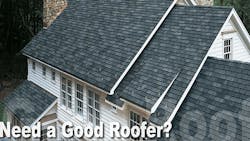Some Denver-Area Residential Roofing Contractors Are Failing At Fall Safety
The residential roofing industry in Denver and area communities, including Pueblo and Colorado Springs, is being cited in record numbers for failing to keep workers safe by providing necessary fall prevention equipment and training. In addition to its own outreach effort on fall prevention, OSHA is teaming up with various organizations, including the Colorado Roofing Association and the Better Business Bureau.
“In the past six months, we have received 63 complaints related to unsafe work practices, and this is the beginning of the roofing season. The cost of providing fall prevention equipment is nominal compared with the cost of a senseless loss of life and livelihood,” said David Nelson, OSHA’s area director in Englewood. “Falls from heights of 6 to 15 feet accounted for 24 percent of all fatal falls in 2012.”
Tips to Avoid Bad Residential Roofing Contractors
Consumers seeking to hire reputable and safety conscious roofing companies should visit the Colorado Roofing Association web site for tips on locating a quality contractor. The association warns: “Beware of scam artists and unlicensed contractors. Not all roofing contractors are legitimate, and too many home and building owners have paid dearly for using them.” They offer these tips:
- Scam artists are unlicensed, uninsured and probably lacking in experience. He may use high pressure or scare tactics, and "bonus offers" to get your business. He may ask you for a substantial down payment prior to starting the job. Beware of any and all such schemes.
- If you do use an unlicensed, uninsured firm or individual, don't be mislead into believing that your homeowner's or personal liability policy necessarily protects you. In many cases, you may be liable for suit.
- A large number of home and building owners have been dragged into litigation involving uninsured contractors. If an employee of an unlicensed contractor is injured on your home or building, you may be responsible for his injuries or disabilities. In addition, you probably have no protection in the event damage is done to your property or the property of others by the roofer during the course of the work.
- Often, the end result of using an unlicensed contractor is a poorly installed or poorly designed roofing system. This is worse than no job at all, and may end up costing you more in the long run.
- Another reason to avoid this type of contractor: if he does not pay the suppliers whose materials are used on your project, you may find a lien placed on your property even though you have paid for the work. This means you may end up paying for the same materials twice.
To file a complaint or research complaints filed against a roofing contractor, consumers can go to the Better Business Bureau's web site. The establishment search on the OSHA web site provides consumers with information on contractors that have been cited for safety and health violations.
“Consumers should be aware that, in many cases, the contractor they sign an agreement with is not necessarily the contractor installing the roof. Many roofing companies are using a different name with a higher Better Business Bureau rating to get the job, but have no roofers to do the install,” said Nelson. “Consumers need to ask questions, such as: Are the installers your employees or subcontractors? Are they insured? What is their past work history? How will the project be managed? What kind of fall protection will be used? Hold your contractors accountable. The last thing a consumer wants is someone falling, especially on their property.”
About the Author

Sandy Smith
Sandy Smith is the former content director of EHS Today, and is currently the EHSQ content & community lead at Intelex Technologies Inc. She has written about occupational safety and health and environmental issues since 1990.
